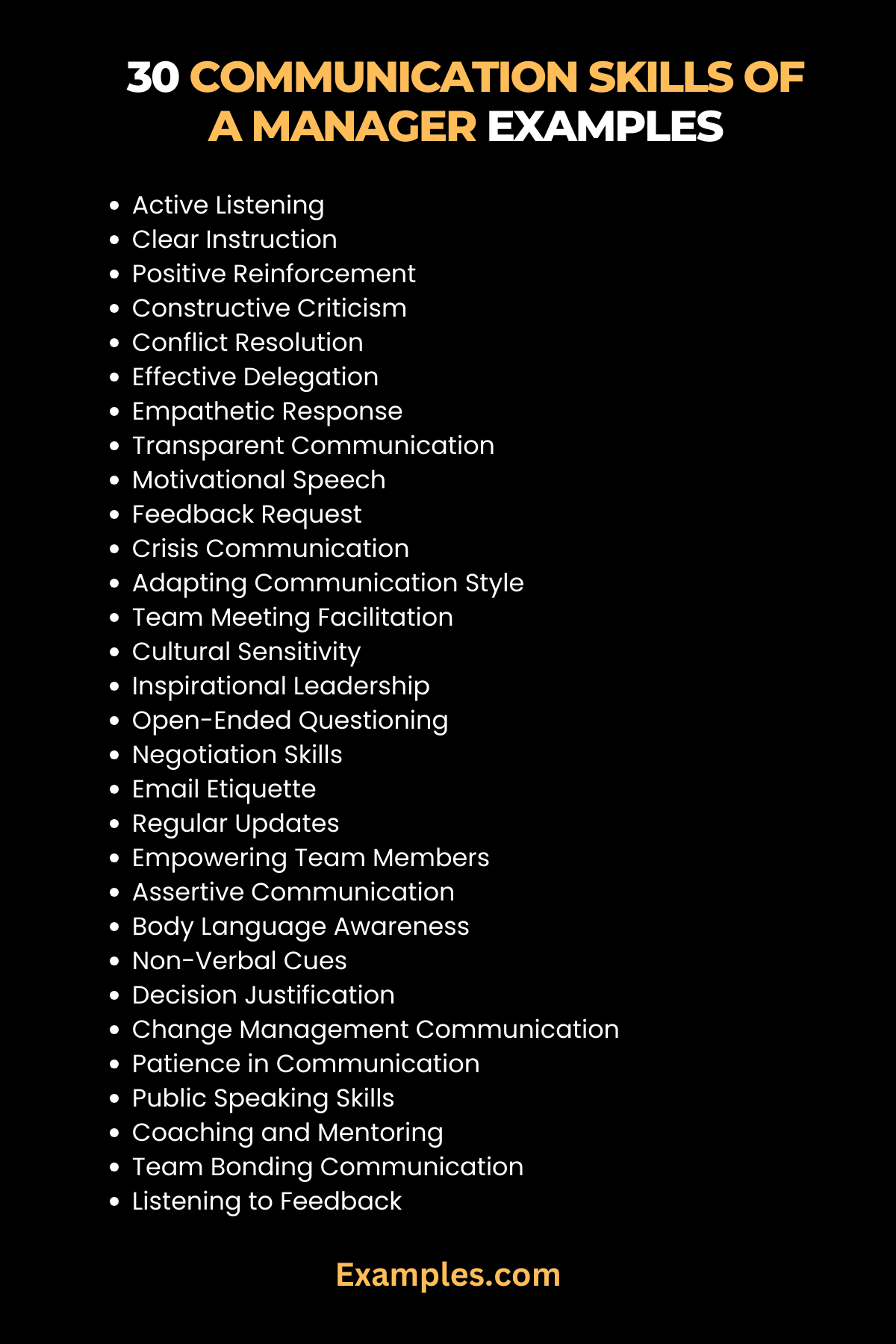29+ Communication Skills of a Manager Examples
30 Communication Skills of a Manager Examples
A manager’s prowess in communication significantly impacts team dynamics, productivity, and workplace morale. This guide highlights 30 critical communication skills every manager should possess, with each skill exemplified through a distinct scenario and accompanying explanation sentences. These examples span various facets of managerial communication, from effective delegation to inspiring leadership, showcasing how adept communication can foster a cohesive, motivated, and high-performing team.

- Active Listening – Example: “I hear your concern about the project deadline. Let’s discuss how we can address this.” A manager shows attentiveness and understanding, creating a supportive environment.
- Clear Instruction – Example: “Please submit the report by 3 PM Thursday, focusing on the marketing metrics.” This directive leaves no room for confusion, ensuring task clarity.
- Positive Reinforcement – Example: “Great job on that presentation! Your approach really engaged our clients.” Acknowledging good work boosts team morale and motivation.
- Constructive Criticism – Example: “Your report was well-researched, but let’s work on presenting the data more succinctly next time.” Offers specific improvement areas while acknowledging effort.
- Conflict Resolution – Example: “I understand both your perspectives. Let’s find a middle ground that suits everyone.” Demonstrates a balanced and fair approach to resolving team disputes.
- Effective Delegation – Example: “John, your skills in data analysis make you the perfect fit for this task.” Assigning roles based on strengths enhances efficiency and job satisfaction.
- Empathetic Response – Example: “I understand this task is challenging. How can I support you in this?” Shows concern for team members’ challenges, fostering trust.
- Transparent Communication – Example: “We are facing budget cuts, and here’s how it might affect our department.” Honesty in communication builds trust and preparedness among team members.
- Motivational Speech – Example: “We have a big challenge ahead, but I am confident in our team’s ability to succeed.” Inspires and rallies the team towards common goals.
- Feedback Request – Example: “I value your input. How do you think we can improve this process?” Encourages open feedback, promoting a collaborative environment.
- Crisis Communication – Example: “In light of the recent issue, here’s our plan to mitigate the impact.” Shows control and direction during challenging situations.
- Adapting Communication Style – Example: “I’ve noticed you prefer emails over meetings, so I’ll send you updates that way.” Adjusts communication methods to suit team members’ preferences.
- Team Meeting Facilitation – Example: “Let’s go around the table and get everyone’s thoughts on this.” Ensures inclusive participation during meetings.
- Cultural Sensitivity – Example: “I respect your cultural perspective. Could you share more about it?” Shows respect for diverse backgrounds, enhancing team harmony.
- Inspirational Leadership – Example: “Our vision is to lead the market, and each of you plays a crucial role in this journey.” Aligns the team with the company’s vision and goals.
- Open-Ended Questioning – Example: “What do you think are the potential impacts of this decision?” Invites expansive thinking and discussion.
- Negotiation Skills – Example: “Let’s find a solution that benefits both our team and our clients.” Strives for win-win outcomes in negotiations.
- Email Etiquette – Example: “Please find attached the project brief. Let me know if you have any questions.” Communicates information clearly and professionally in written form.
- Regular Updates – Example: “Here’s the weekly project update to keep everyone informed.” Keeps the team aligned and updated on progress.
- Empowering Team Members – Example: “I believe in your ability to lead this project. I’m here for guidance if needed.” Delegates responsibilities to empower and develop team members.
- Assertive Communication – Example: “It’s important that we adhere to the deadlines we’ve set for the project’s success.” Asserts needs and expectations clearly without being aggressive.
- Body Language Awareness – Example: Maintains eye contact and nods during discussions, showing engagement and understanding.
- Non-Verbal Cues – Example: Observes team members’ body language to gauge their reactions and adjust communication accordingly.
- Decision Justification – Example: “I chose this direction based on market trends and our team’s strengths.” Explains the reasoning behind decisions to the team.
- Change Management Communication – Example: “As we adapt to these changes, I’m open to your suggestions and concerns.” Guides the team through changes, maintaining open dialogue.
- Patience in Communication – Example: Takes time to listen fully without interrupting, showing respect for team members’ opinions.
- Public Speaking Skills – Example: Delivers clear, confident, and engaging speeches during company events, effectively representing the team.
- Coaching and Mentoring – Example: “Let me share some strategies that might help you with this challenge.” Provides guidance to support team members’ growth and development.
- Team Bonding Communication – Example: Organizes and leads team-building activities to strengthen interpersonal relationships.
- Listening to Feedback – Example: “Your feedback is valuable. Let’s discuss how we can implement this.” Demonstrates openness to team suggestions, fostering a culture of continuous improvement.
7 Key Communication Skills for Managers
Effective communication is vital for managerial success. Managers must excel in various communication aspects to lead teams effectively, resolve conflicts, and foster a positive workplace culture. Here are 10 unique examples showcasing these essential skills:

Clear Articulation: During a team meeting, a manager clearly outlines the project goals and individual responsibilities. This ensures everyone is on the same page, reducing confusion.
Constructive Feedback: After a presentation, a manager provides specific, actionable feedback to a team member, highlighting areas of strength and improvement. This approach helps in personal and professional growth.
Empathy: A manager recognizes an employee’s struggle with work-life balance and discusses possible solutions. Empathetic communication fosters trust and loyalty.
Adaptability in Communication Style: When explaining a technical concept to non-technical staff, a manager uses simple language and visual aids. Adapting communication style to the audience enhances understanding.
Conflict Resolution: A manager mediates a disagreement between two team members, encouraging them to express their viewpoints and finding a common ground. This skill is crucial for maintaining a harmonious work environment.
Motivational Communication: During a challenging phase, a manager inspires the team with a motivational talk, emphasizing the team’s strengths and past successes. This boosts morale and productivity.
Openness to Feedback: A manager asks for feedback on their leadership style in a team meeting, showing a willingness to learn and grow. Openness to feedback demonstrates humility and commitment to improvement.
Effective Delegation: By clearly communicating tasks and expectations, a manager effectively delegates a project, ensuring team members understand their roles. Effective delegation is key to efficiency and empowerment.
Transparency in Decision Making: A manager explains the rationale behind a tough decision to the team, ensuring transparency. This builds trust and respect among team members.
Importance of Communication Skills for Managers
Effective communication skills are vital for managers to lead teams, articulate visions, and foster a positive work environment. Strong communication builds trust, enhances team collaboration, and ensures transparency in operations. By mastering these skills, managers can effectively guide their teams towards achieving organizational goals.

- Clarifying Expectations: A manager explains project objectives clearly, ensuring each team member understands their role and responsibilities. This prevents confusion and keeps the team aligned with their goals.
- Active Listening During Meetings: Actively listening to team feedback in meetings, a manager acknowledges diverse viewpoints and fosters an inclusive atmosphere.
- Non-Verbal Cues in Presentations: Utilizing non-verbal communication, such as eye contact and gestures, during presentations to reinforce messages and engage the audience.
- Conflict Resolution: A manager mediates disputes by understanding different perspectives and finding common ground to resolve conflicts amicably.
- Motivational Speeches: Inspiring the team through motivational speeches that boost morale and encourage a positive outlook on challenging tasks.
- Feedback Sessions: Conducting one-on-one feedback sessions, a manager provides constructive criticism and acknowledges accomplishments, promoting personal and professional growth.
- Email Communication: Crafting clear and concise emails that convey necessary information and expectations without ambiguity.
- Crisis Communication: Effectively communicating during crises, ensuring the team remains calm and focused on solutions.
- Empathy in Conversations: Showing empathy in conversations, a manager builds strong relationships and understands the team’s needs and concerns.
- Team Building Activities: Leading team-building activities that encourage open communication and strengthen team bonds.
Manager Communication Skills in the Workplace
Effective manager communication skills in the workplace are crucial for fostering a productive and positive environment. These skills enable managers to convey their vision, manage team dynamics, and drive organizational success. Mastery of various communication forms, from verbal to digital, enhances team efficiency and workplace harmony.

- Setting Clear Deadlines: A manager communicates specific deadlines for projects, ensuring team members understand the timeframe and prioritize tasks accordingly.
- Regular Team Updates: Holding regular update meetings, a manager keeps the team informed about project progress and upcoming challenges.
- Open Door Policy: Implementing an open-door policy, a manager encourages team members to share their ideas and concerns freely.
- Constructive Feedback in Performance Reviews: During performance reviews, a manager provides constructive feedback that focuses on growth and improvement.
- Inclusive Decision Making: Inviting team input in decision-making processes to foster a sense of ownership and collaboration among team members.
- Acknowledging Achievements: Recognizing and celebrating team achievements, a manager boosts morale and motivates the team.
- Handling Customer Complaints: Demonstrating how to handle customer complaints effectively and professionally.
- Encouraging Innovation: Encouraging creative thinking and innovation through open discussions and brainstorming sessions.
- Cultural Sensitivity in Communication: Displaying cultural sensitivity in communication to ensure all team members feel respected and included.
- Training Sessions: Conducting training sessions to improve team skills and knowledge, fostering continuous learning and development.
Why Do Managers Need Communication Skills?
In the dynamic landscape of the modern workplace, the necessity for effective communication skills in managers cannot be overstated. Managers are the linchpins in the machinery of any organization, connecting the strategic goals of the business with the operational execution. Their ability to communicate effectively is critical in steering teams towards success. Here are several reasons why these skills are indispensable:
- Facilitating Clear Direction: A manager with strong communication skills articulates expectations and goals clearly, ensuring that every team member is aligned and moving in the same direction. This clarity mitigates misunderstandings and enhances productivity.
- Building Relationships: Effective communication fosters trust and rapport between managers and their teams. It creates a more cohesive and supportive work environment, which is vital for collaborative success.
- Enhancing Team Engagement: Managers who communicate effectively are more likely to engage their teams. They understand the importance of listening, providing feedback, and acknowledging the efforts of team members, which boosts morale and motivation.
- Resolving Conflicts: Conflict is inevitable in any workplace. A manager adept in communication skills can navigate these situations delicately, ensuring that conflicts are resolved constructively and without causing long-term damage to team dynamics.
- Driving Change: In an era of constant change, managers must be able to communicate the reasons, benefits, and strategies of change initiatives effectively to ensure team buy-in and smooth transitions.
What Must-Have Communication Skills for Managers?
To excel in their roles, managers should master a range of communication skills. Here are some essential ones:
- Effective Listening: Often underrated, listening in communication skills is crucial. It involves not just hearing but understanding the message being conveyed. This skill helps managers to understand issues deeply and respond appropriately.
- Clarity and Conciseness: The ability to communicate ideas clearly and concisely is paramount. This ensures that the team understands the tasks and objectives without ambiguity.
- Empathy: Empathy in communication skills enables managers to understand and relate to the emotions and perspectives of their team members, fostering a supportive work environment.
- Feedback Skills: Constructive feedback is a cornerstone of effective communication. Managers must be skilled in both giving and receiving feedback to promote personal and professional growth within their teams.
- Persuasion and Influence: Persuasion in communication skills helps managers to motivate their team, align them with organizational goals, and drive change effectively.
- Adaptability: The ability to adjust communication styles to suit different team members and situations is a valuable skill for any manager.
- Digital Communication Proficiency: In the age of remote work and digital platforms, proficiency in digital communication tools is essential. This includes not just emails and messaging apps but also video conferencing and social media platforms.



